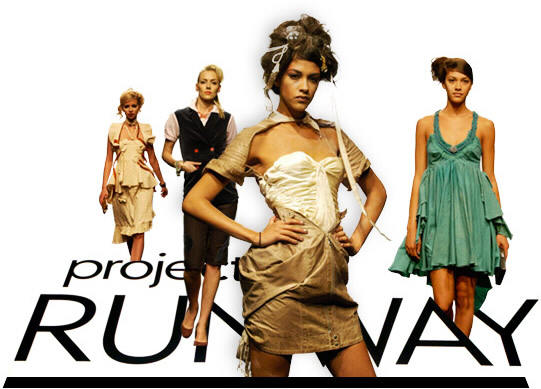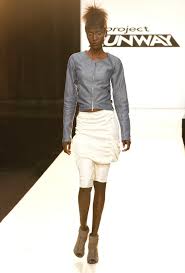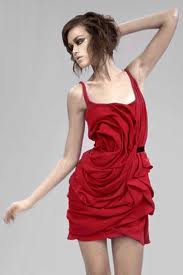 OK, I will admit to watching a reality show– Project Runway. I started watching after it moved to Lifetime and have seen five or six seasons. What I really liked at first was to watch people sewing!
OK, I will admit to watching a reality show– Project Runway. I started watching after it moved to Lifetime and have seen five or six seasons. What I really liked at first was to watch people sewing!
I love the very idea of people buying fabric, drawing designs, cutting out patterns, using sewing machines, fitting things on models, and then a runway show to pick the winner. I especially love the challenge when they create their own prints.
 As time has gone on, watching a group of dysfunctional and very exhausted creative people lose it has become much less appealing. I haven’t learned anything about fashion, but I have learned the buzz words: “fashion forward,” “meticulous,” “hip,” “cool,” “edgy” and “editorial.” You want to “know your woman.” On the flip side, you don’t want your clothes to look “old,” “sad,” “boring,” “poorly constructed” or “confusing.” You want to edit your looks, but also be bold, take risks, and have a “wow factor.” Yeah. Good luck!
As time has gone on, watching a group of dysfunctional and very exhausted creative people lose it has become much less appealing. I haven’t learned anything about fashion, but I have learned the buzz words: “fashion forward,” “meticulous,” “hip,” “cool,” “edgy” and “editorial.” You want to “know your woman.” On the flip side, you don’t want your clothes to look “old,” “sad,” “boring,” “poorly constructed” or “confusing.” You want to edit your looks, but also be bold, take risks, and have a “wow factor.” Yeah. Good luck!
At the beginning of every episode we are reminded of the fabulous prize package. This past season it included money, technology, sewing machines, a chance to feature a clothing line at Belk department stores and online, a trip to the Maldives and a Lexus! The prize package was worth over $500,000. Most of the designers act as though winning Project Runway will mark the beginning of their grand career. The fashion show will be only the first of many, and their glamorous and high-powered career will begin.
Unfortunately, for the 11 previous winners this has not turned out to be so. A look at previous winners shows that a couple can only boast to be selling their clothes on their own etsy.com shops. But all of them seem to be designing, making, and selling clothes.
 So what does it mean to win? This is a topic close to my heart, as for a long time there it looked like I was going to win the poet’s sweepstakes, getting prizes and residencies and even a prestigious fellowship. But my book never “won,” and contests are the number one way books of poetry are published in the United States. Without the publication credit, I didn’t go on to a place in academia (in retrospect, I’m so grateful).
So what does it mean to win? This is a topic close to my heart, as for a long time there it looked like I was going to win the poet’s sweepstakes, getting prizes and residencies and even a prestigious fellowship. But my book never “won,” and contests are the number one way books of poetry are published in the United States. Without the publication credit, I didn’t go on to a place in academia (in retrospect, I’m so grateful).
So I have spent my most recent midlife period turning to self-publishing. Because I do still write. And this is a very good time to be a writer, with good self-publishing options and the stigma, such as it is, over self-publishing falling away.
I felt for the four designers standing on the platform at the last episode of Project Runway, Season 12. Only one would win the big prize package, and at least three of them seemed to think that was the difference between ultimate success and failure. So despite all those designers going off the show before them, saying as they packed up their stuff in the workroom, “You haven’t heard the last from me! I’ve learned a lot and I’m going back to get to work!” here were the finalists, each of them with a show during New York Fashion Week, increased visibility and a roster of high-profile fans. Surely there are opportunities for all of them. And yet, the pond they swim out into– including the winner– is harsh and large and full of sharks.
Perhaps we would all do well to scale back our expectations, at least a bit farther back than reality t.v. would have us set them. What are we really after here? How do we define success? The approbation of the big wigs in the biz is certainly a powerful thing. However, if one can makes a living, even a bare living, doing what one loves, creating things, well that’s pretty darn good! And people love love love their etsy!



I love Project Runway, and still follow Chloe Dao, Christian Siriano, and (especially) Mondo Guerra. Your deepr questions of what it means “to win” and what creative types can expect is such a good one. I have several younger cousins and godchildren who finance their artistic selves through “crowd sourcing” (esp. Kickstarter) and raise incredible amounts of money via that–never ceases to amaze me that in a 30-day campaign they can raise much more money for a project (30 to 185 K) than I would make in a whole year of teaching. But they find it a new and “fairer” way to deal with patronage, that thousands-year-old tradition of funding art. Complicated questions, especially so for me as it tangles in with a vow of poverty and questions about the meaning of “making a living.” I love your blog, Susan, and the questions you raise. And I admit to loving lots of reality tv–so fascinating though it is as artful/artificial, I think, as anything that admits to being scripted, I think, in the way the clips are edited and cherry-picked to make a story. Thanks for helping me think and reflect more on these things.